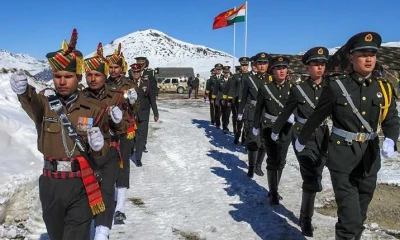Arunachal Pradesh Governor Lieutenant General KT Parnaik (Retd), remarking on the Bharat-China border situation, stated the current agreements and protocols disproportionately favour China’s People’s Liberation Army to the detriment of Bharat.
Gen Parnaik asserted, “We have a peculiar situation with agreements and protocols being mainly framed to suit the PLA with no settlement of boundary cartographic invasions and an invisible non-designated line to defend.”
He further explained, “With ‘no use of weapons’ we are disadvantaged along the LAC (Line of Actual Control)… Frequent intrusions by the PLA violating the agreements is a critical and sensitive issue needing a firm sense of ‘reciprocity’.”
Highlighting the need for a strategic shift, he added, “The MEA (Foreign Affairs Ministry) and MoD (Defence Ministry) need to be prepared with a new set of agreements that can be implemented with clarity and also create arguments to dispel Chinese dynastic claims with our civilisational counter claims.”
Gen Parnaik made these remarks while speaking in New Delhi at the second edition of the “Lieutenant General PS Bhagat Memorial Lecture” jointly held by the Indian Army and United Services Institution of India or USI. The event was attended by the top brass of the Indian Army, including Chief General Manoj Pande, and many former chiefs.
The mutual understanding and stated terms of engagement between Bharat and China mandate that no guns are to be fired on the LAC under any circumstances. Border patrol teams are either unarmed or carry guns with their barrels pointed downwards.
China claims Arunachal Pradesh as its own, referring to it as ‘Southern Tibet’. Arunachal Pradesh shares a 1,125 km-long border with China.
Regarding Pakistan, the Governor suggested that an “aggressive punitive deterrence policy needs to be continued.”
Referencing recent unrest in Pakistan-Occupied Kashmir (PoK), Gen Parnaik remarked, “Unrest in Pakistan provinces allows us space for political manoeuvre while opposition to CPEC (China Pakistan Economic Corridor) would keep the Chinese tentative.”
He further advocated, “Focus on re-integration of PoK through peaceful voluntary means. Finally, avoidance of a two-front war needs to be strategised and ensured.”

















